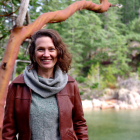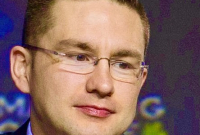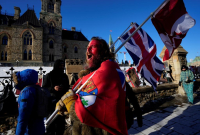Support strong Canadian climate journalism for 2025
I grew up on the wrong side of the story.
One of my earliest memories is watching then-president Ronald Reagan rail against welfare mothers as the epitome of what was wrong in America. I was sitting in front of our little black and white TV, eating some of that rubbery cheese stuff that came with our food subsidy as my “welfare” mom popped popcorn for our dinner in the other room. A feeling rose up in me like I was dirty from the inside.
I’d feel that again.
I felt it when I was caught holding my little brother’s hand at the fair and two boys screamed “n***** lover.” Or when my mother told me the story of being pulled over by the police for driving with my brother in the passenger seat. My mother is white. My brother is Black. That’s not a crime in the U.S. — or it’s not on the books as a crime. They did it “for her own good.”
I felt it every time somebody shared some racist thought with me because my skin is white and my eyes are blue. Like the stepmom who said she didn’t have “anything against Black people, it’s just that they should only have babies with their kind.”
I felt it when I was told that one of my “uncles” had tried to gas himself to death after he was diagnosed with AIDS in the early 1980s. He’d already lost his family, his job, and his housing. We didn’t blame him when he succeeded because the alternative was everywhere in the media: the slow, lonely, ostracized death. This was before we acknowledged that gay people had human rights.
And then I went to the most liberal of liberal arts colleges in the U.S. I was fed a steady diet of identity politics along with science, history, and ecology. There I learned at least two things: we don’t hear the stories of the minority voices and few will applaud you if you try to tell the stories of a group to which you do not belong.
I left the U.S. for Canada and swore my oath as a Canadian citizen on World Peace Day. A day when all humanity commits to building a culture of peace. The judge reminded us that as a Canadian that included making reconciliation an active part of our lives.
Today, I am a writer, a mother, an immigrant. I am also white, middle-class, and possess an advanced degree. When I think about reconciliation, I think about the girl I once was and the vast expanse of privilege that separates us. She’d want to know what I was doing to ensure that we not only learn the history of the wrongs that came before but also those that continue to be perpetuated in systems created from empires that primarily valued the white, male, landowner; in institutions created to serve these systems; and in individuals that get stuck in inherited values, fears, prejudices.
We are all more than what we appear on the outside, under the title of any one label, or that can be summed up in any one story. Whose job is it to tell the stories that make us human to each other?
In the U.S., the media is considered so important to a functional democracy and limiting the powers of the government in favour of the people, that it’s often referred to as the Fourth Estate. The constitutional amendment that governs it says: “Congress shall make no law … abridging the freedom of speech, or of the press; or the right of the people peaceably to assemble.”
Similar precedent exists in the Canadian Charter of Rights and Freedoms, but with less clarity. In 2020, at the beginning of the pandemic, Justin Trudeau affirmed the importance of the press saying: “A free-thinking, independent, and respected media is the cornerstone of any democracy. One cannot exist without the other.”
The International Press Institute concluded as early as 2020 that the pandemic was disrupting this lofty goal, saying the “public health crisis has allowed governments to exercise control over the media on the pretext of preventing the spread of disinformation.”
As a member of the media these days, I feel that same horrible feeling as I did when I was a child. The storyline may be different today, but the plot is the same. Somebody is right and somebody is wrong. The right side is the one that the white man on the TV (or screen of choice) endorses. If you aren’t on his side, you are endangering our children/elders/health/nation/democracy.
Perhaps you are the type to want to stand up for, or at least listen to, the underdog. I am still filled with shame for the little me who wondered why the welfare mothers didn’t get jobs, who dropped my brother’s hand when I was screamed at, who didn’t hug my HIV-positive “uncle” and never let go. Who is the scapegoat today? Perhaps it is the unvaccinated nurse who lost her job, the trucker who bet everything to stand up for his unvaccinated buddy, or the “fringe minority” of Canadians ready to protest to end all COVID mandates.
Either way, we benefit from hearing all of the stories. It’s our job as Canadians to ask the person most different from us: What is it that I do not know? It’s my job as a writer to tell the stories that aren’t being told, even if I fail to do it perfectly. It’s your job as a reader to demand more than the stories from those who the majority believe is “right.”
Somewhere in there — between right and wrong, vaccinated and unvaccinated, most and few — is our humanity, and she wants to be heard.






Comments
A beautiful and touching article.......one that I mostly agree with. The pandemic has put this open listening to all sides to the test however, and I don't think I can fully endorse the perspective eloquently argued here.
I remember some of the awful things said and done to our gay citizens during the AIDS crisis...I have a premier who worked hard to make sure dying AIDS patients didn't get to have their partners by their deathbeds.
But refusing the vaccines has been bolstered by misinformation and downright lies circulating on social media. Charlatans have made money preaching hokem to the gullible. Innocent people have died horrible deaths and hospitals been overwhelmed by covid patients to the extent that older Canadians have died of conditions that might have been treatable.
So this polarization, while it does overlap with the old power imbalances of gender, colour, caste and wealth......has a new dimension. I think it is being used by the old power lords, to maintain a free market capitalism that can't exist without it's Other. We demonized blackness because wealthy men needed cotton slaves; we demonized feminists because patriarchal men needed the care work for free and not the competition in the market. We demonized native Americans because we wanted their land.
During this pandemic, the same forces have worked hard to demonize medical science. And much as I feel for some of the individuals conned by the lies ignoramuses and snake oil salesmen have perpetuated on the gullible......I'm finding it hard to listen to, or have sympathy for, the people blockading our national capital.
It would require me to participate too fully in a very old double standard...to do so. Until there is one law for all of us, none of our dreams of social equality will have a chance of coming true.
Move those trucks. Tear gas those who won't go.
Well stated and I agree with you.
Hi Manda, I would not equate your experience of racism and other unjust discrimination against minorities with the uncomfortable feeling about the minority of extremists, conspiracy theorists, and egomaniacs whose concept of freedom has nothing to do with, well, freedom.
Yes, I agree, we need to hear their stories. Their stories have actually been heard. Ottawa residents have heard it enough, even in their sleeps. I don't think our humanity compels us to tolerate the inflated egos of this minority of truck drivers. Would you tolerate them if they started demanding freedom from the measles vaccine as well?
Your thoughts are beautiful, and I agree that even these egomaniacs are complex human beings deserving respect. But we also have to recognise the threat they pose. And we have to recognise when their ideas are based on falsehoods. And when we clarified all that (which many of us already did) then we have to act in the best interest of our communities, be it removing the protesters and/or mandating vaccines.
Well written and I concur.
Perfect
"Perhaps it is the unvaccinated nurse who lost her job, the trucker who bet everything to stand up for his unvaccinated buddy, or the “fringe minority” of Canadians ready to protest to end all COVID mandates."
Sorry, no sympathy from this corner.
There is no right or freedom to infect your neighbours with a potentially deadly disease. There is no right or freedom to drive drunk, either.
Society restricts our behavior and activities in countless ways, and most of us comply without a fuss. Communal responsibility and civic duty. Such is the cost of living together.
Conflating the COVIDiots' self-imposed ostracism and unhappiness with restrictions applicable to all with racism, homophobia, fear of AIDs, etc., does not wash. The anti-vaxxers made their ill-informed choice of their own free will — and must now live with the consequences. Some Canadians — innocent bystanders — will fall severely ill and die because of anti-vaxxers' foolish choices. Save your tears for them.
The suggestion that common-sense public health measures are some plot by the "white man" to preserve his dominion is way over the top.
Sorry to see this poor excuse for anti-vaxxer propaganda on The Observer.
For shame.
Humans need Love and respect to survive. In tyrannical countries there is little of that and compliance is expected, or you disappear.
That tone in is enough to scare any decent person off anything.. The Government is not following its own Laws when it comes to emergencies.
I will not support any kind of violence from any side, in anything,
Why are they not allowed to treat this flu like virus right off, meaning early treatment? Why are doctors threatened if they do?
They are following their OATH and doing the right thing.
FEAR weakens people's immune system which is the most important thing in keeping humans healthy. Mass hysteria seems to have engulfed much of humanity. I dropped it once it became so over the top it makes no more sense. If they won't early treat anything there is a huge question that begs an answer. Why not? Many I have heard do believe in vaccines... and they have had shots and also had Covid and recovered because of early treatments. They are doctors in the US. So they know there are treatments that do work.
We need to stop following fear and use our own judgements.
Anywhere in the world where there is silence it's clear evil is going on.
Why is there bad substances in them? Why so many injuries... silenced? Just saying.
Honesty is best practice and dishonesty is a failure to disclose.
Not one medication no matter if carefully made, or not., will, or could ever fit all people. That is just logical. We are created unique and have three main components: Mind. Body. Soul. When there three are in alignment/sync health is in tact. Fear mongering breaks that alignment.
Check facts not run by the fear, but from professionals, not fear followers. Please note: Biblical writings of God are clear that God does not use fear. 'Perfect love casts out fear.' 'Be not afraid.' People use Fear when they are afraid and/ or are pushing hidden agendas.
After two it's clear they are not working. That means adjust the vaccine and stop until that is done and safely done.
Vaccines, remember, are an extremely lucrative business. Billions are being made... and these companies which test their own products,
refuse to be responsible for any vaccines they make. Why is that allowed?
Would you hire anyone who refused to be responsible for what they do, or, make???